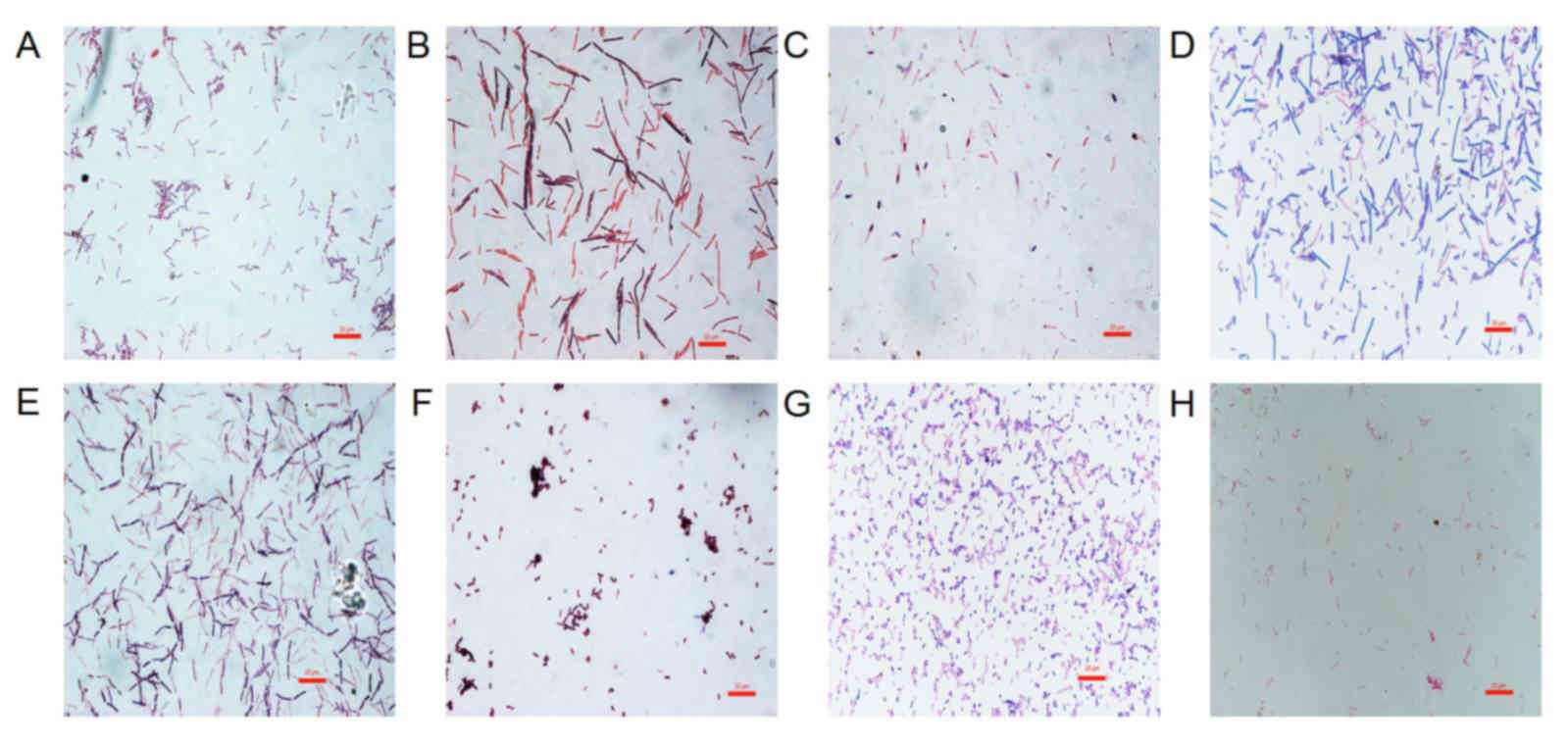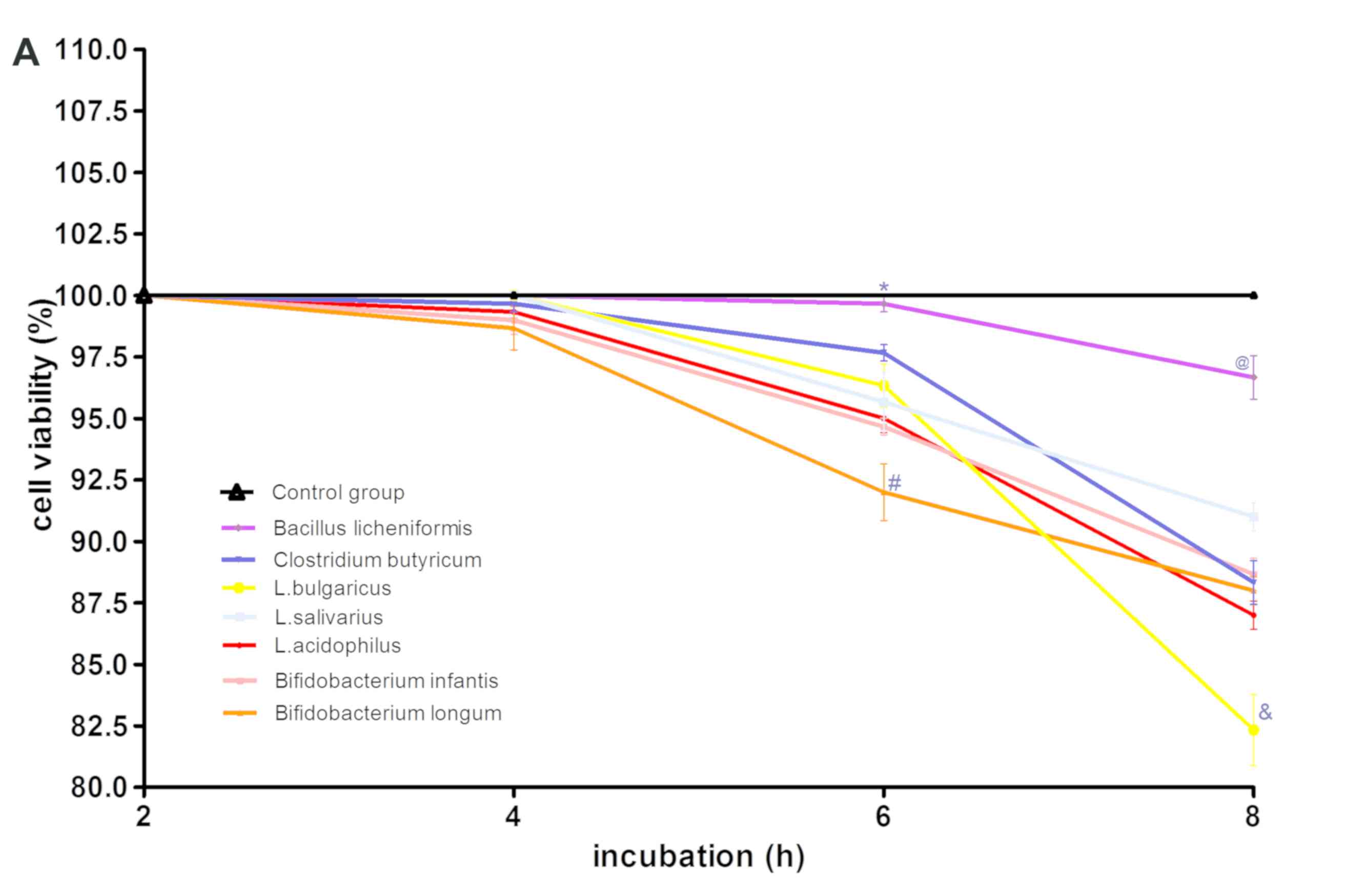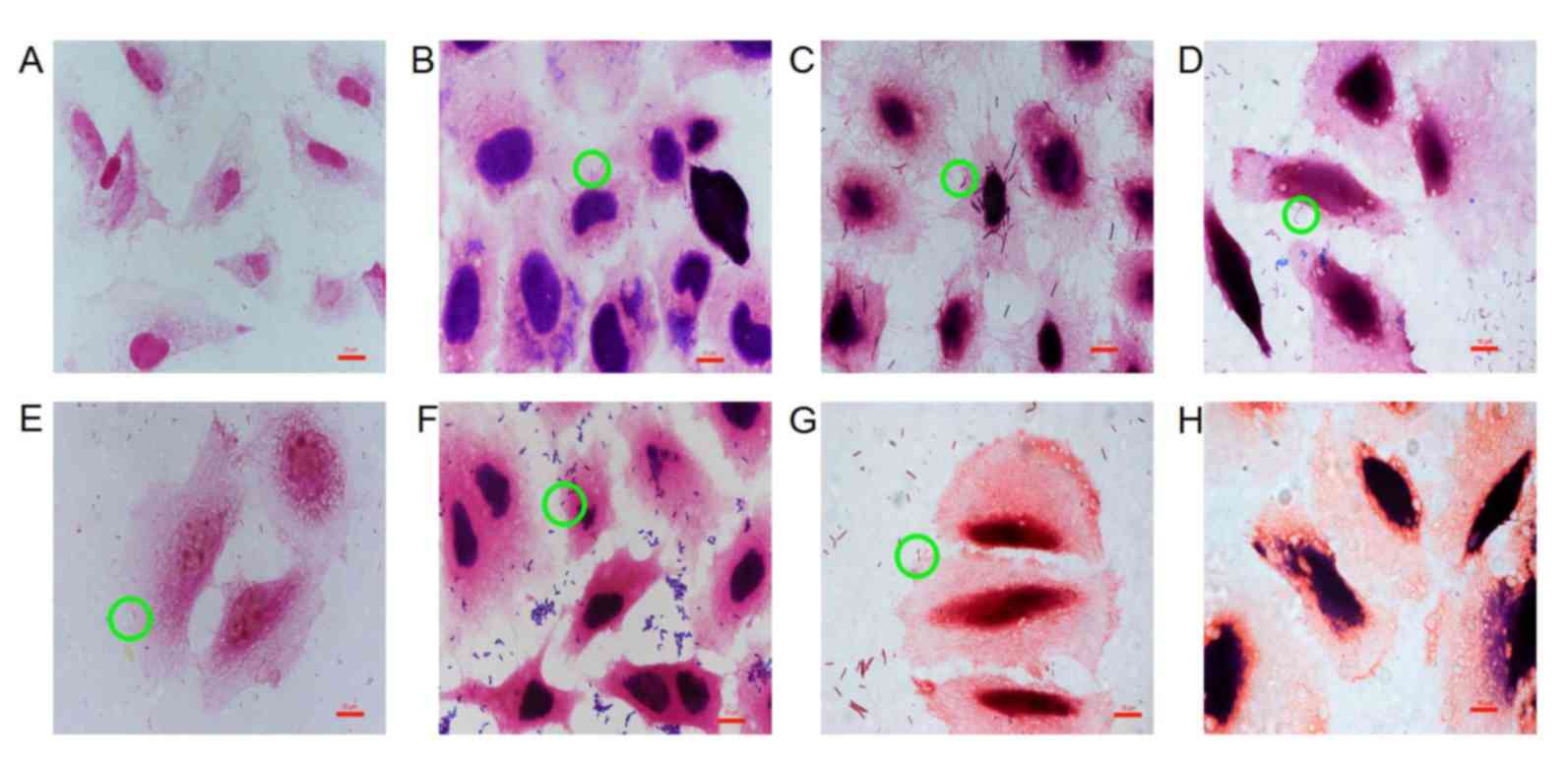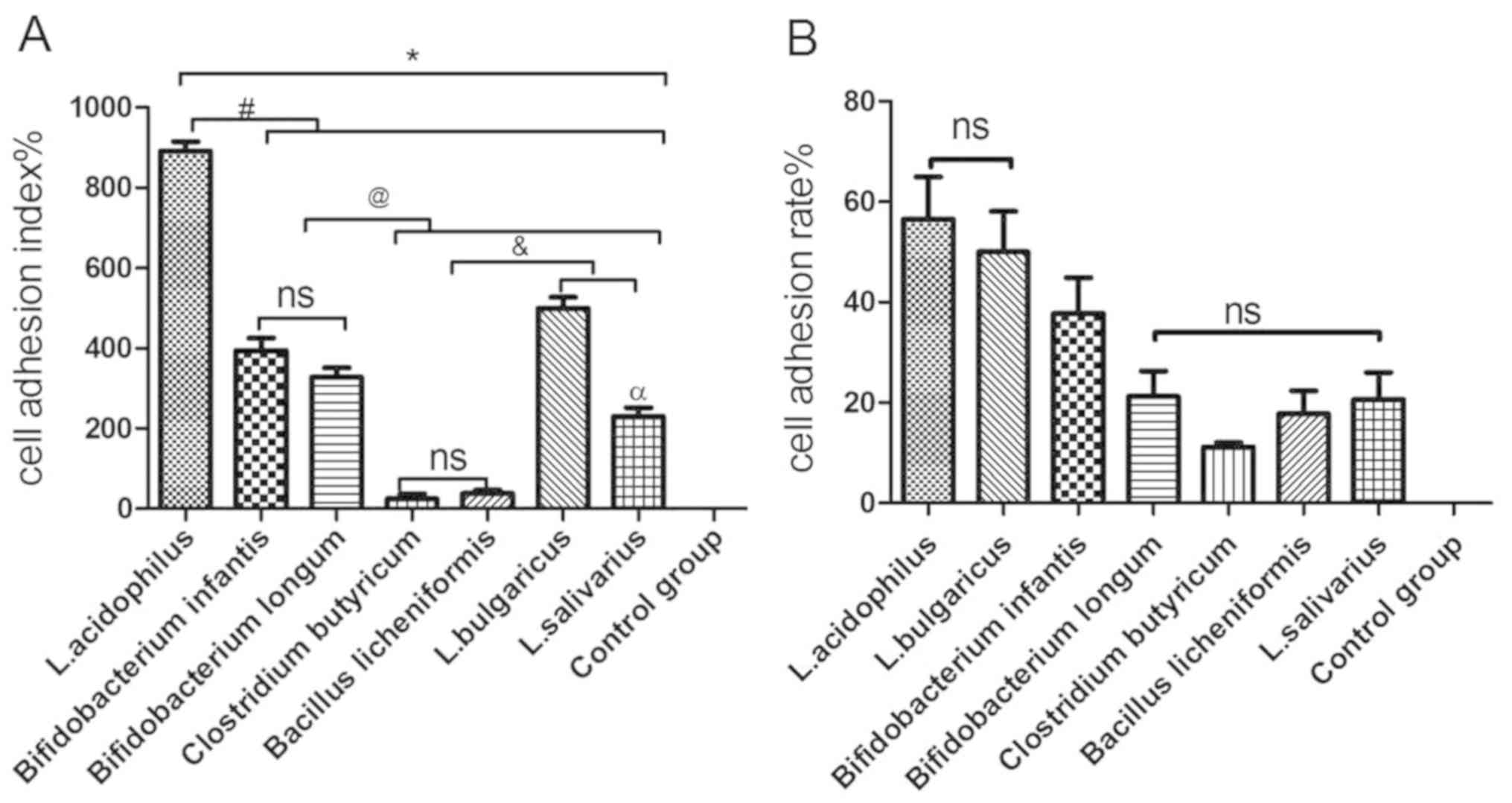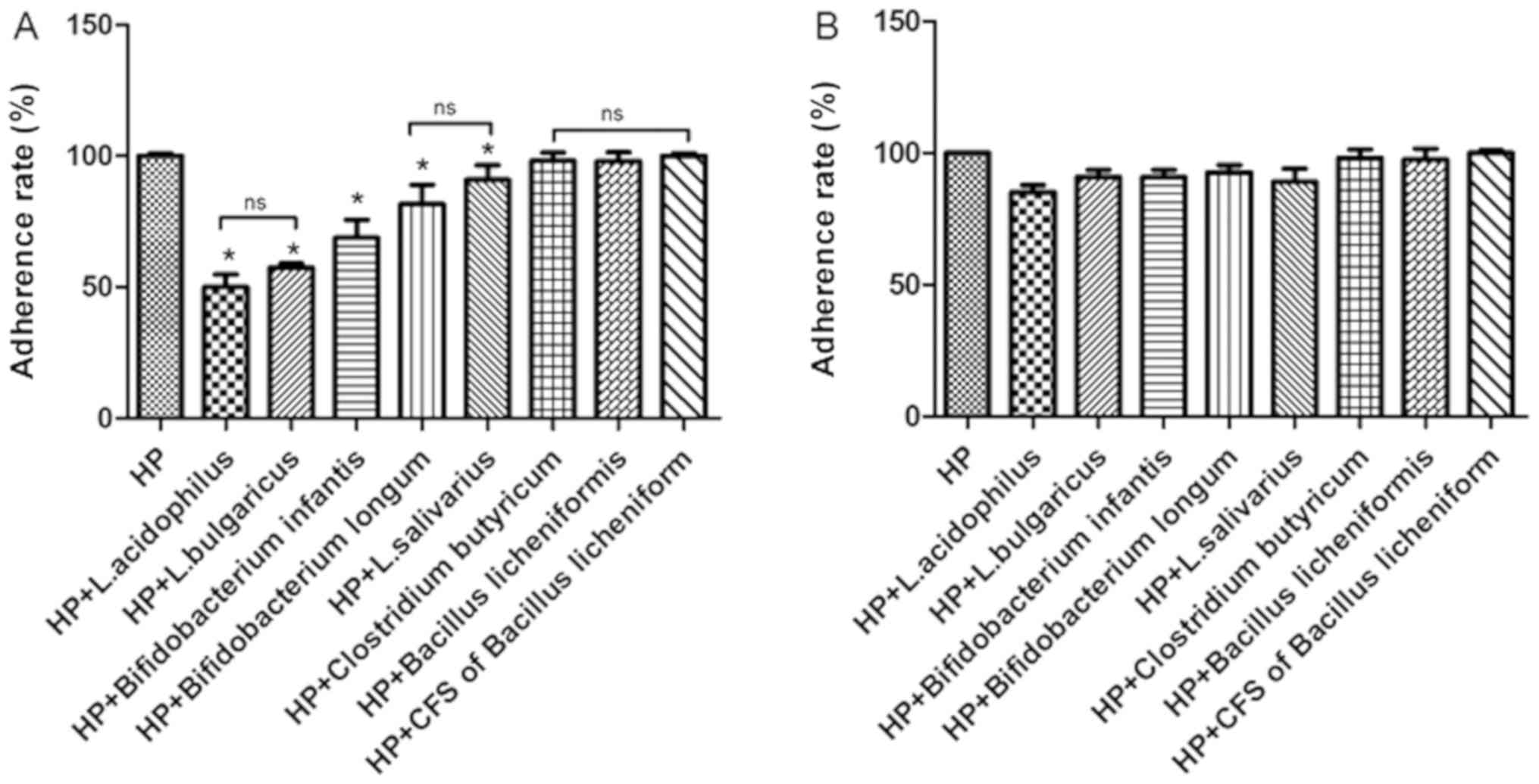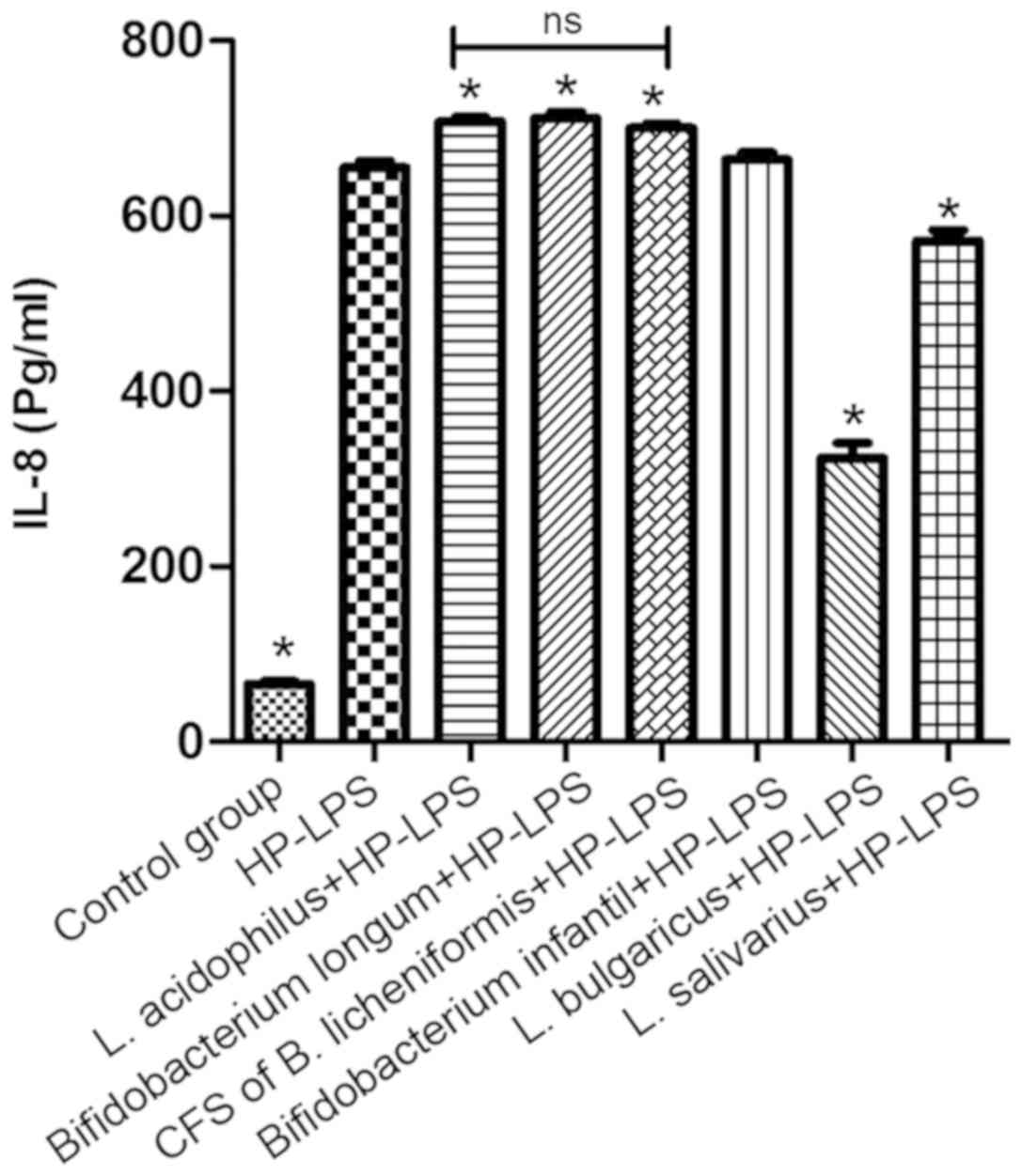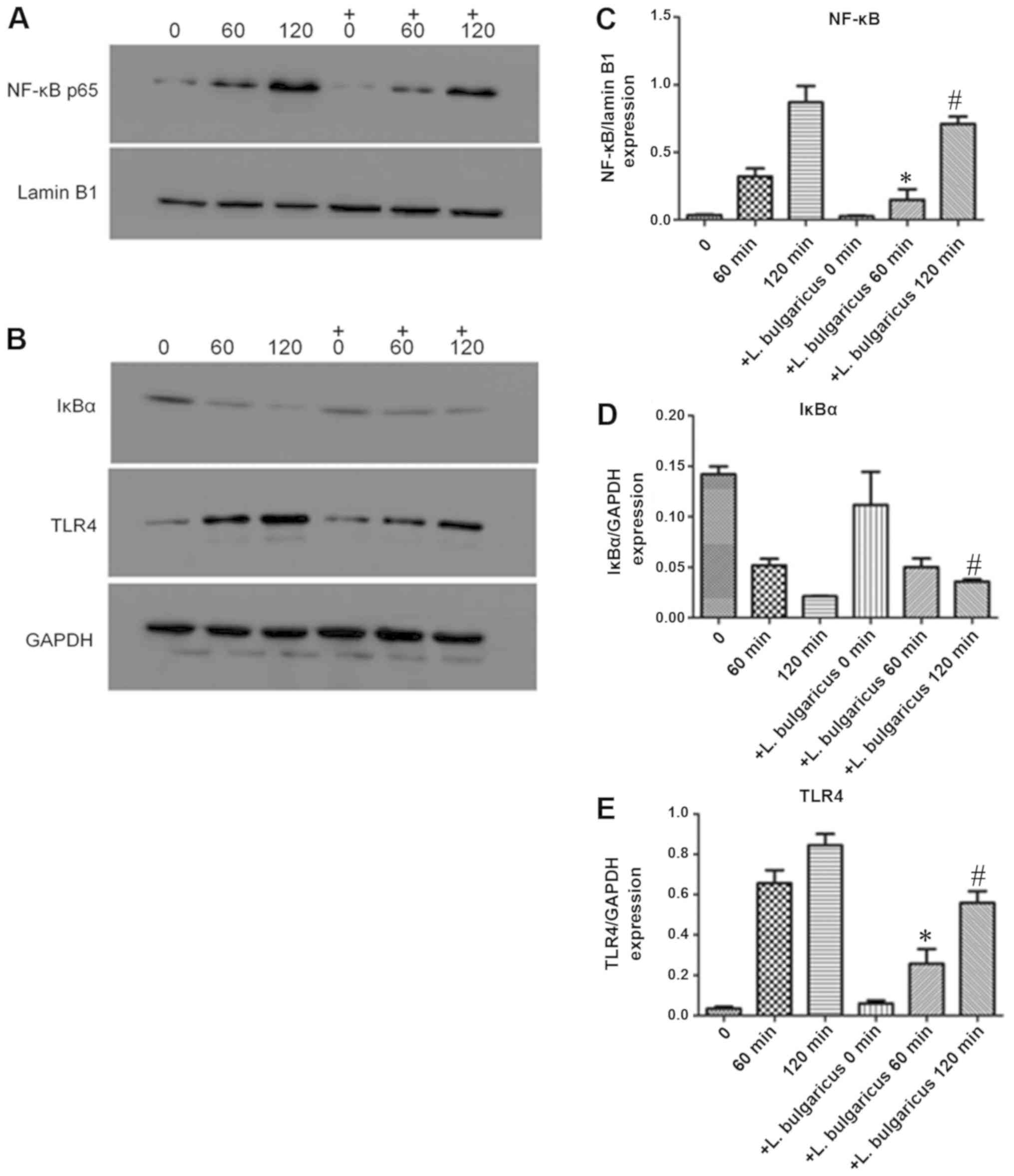|
1
|
Warren JR and Marshall B: Unidentified
curved bacilli on gastric epithelium in active chronic gastritis.
Lancet. 1:1273–1275. 1983.PubMed/NCBI
|
|
2
|
Kusters JG, van Vliet AH and Kuipers EJ:
Pathogenesis of Helicobacter pylori infection. Clin
Microbiol Rev. 19:449–490. 2006. View Article : Google Scholar : PubMed/NCBI
|
|
3
|
Salama NR, Hartung ML and Müller A: Life
in the human stomach: Persistence strategies of the bacterial
pathogen Helicobacter pylori. Nat Rev Microbiol. 11:385–399.
2013. View Article : Google Scholar : PubMed/NCBI
|
|
4
|
Fock KM, Graham DY and Malfertheiner P:
Helicobacter pylori research: Historical insights and future
directions. Nat Rev Gastroenterol Hepatol. 10:495–500. 2013.
View Article : Google Scholar : PubMed/NCBI
|
|
5
|
Todo K, Ohmae T, Osamura T, Imamura T and
Imashuku S: Severe Helicobacter pylori gastritis-related
thrombocytopenia and iron deficiency anemia in an adolescent
female. Ann Hematol. 95:835–836. 2016. View Article : Google Scholar : PubMed/NCBI
|
|
6
|
Franchini M, Vescovi PP, Garofano M and
Veneri D: Helicobacter pylori-associated idiopathic
thrombocytopenic purpura: A narrative review. Semin Thromb Hemost.
38:463–468. 2012. View Article : Google Scholar : PubMed/NCBI
|
|
7
|
Gao W, Cheng H, Hu F, Li J, Wang L, Yang
G, Xu L and Zheng X: The evolution of Helicobacter pylori
antibiotics resistance over 10 years in Beijing, China.
Helicobacter. 15:460–466. 2010. View Article : Google Scholar : PubMed/NCBI
|
|
8
|
Chey WD, Leontiadis GI, Howden CW and Moss
SF: ACG Clinical Guideline: Treatment of Helicobacter pylori
Infection. Am J Gastroenterol. 112:212–239. 2017. View Article : Google Scholar : PubMed/NCBI
|
|
9
|
Graham DY, Fagoonee S and Pellicano R:
Increasing role for modified bismuth-containing quadruple therapies
for Helicobacter pylori eradication. Minerva Gastroenterol
Dietol. 63:77–79. 2017.PubMed/NCBI
|
|
10
|
Masannat Y and Nazer E: Pepto bismuth
associated neurotoxicity: A rare side effect of a commonly used
medication. W V Med J. 109:32–34. 2013.PubMed/NCBI
|
|
11
|
Kafshdooz T, Akbarzadeh A, Majdi
Seghinsara A, Pourhassan M, Nasrabadi HT and Milani M: Role of
probiotics in managing of Helicobacter pylori infection: A
review. Drug Res (Stuttg). 67:88–93. 2017.PubMed/NCBI
|
|
12
|
Urrutia-Baca VH, Escamilla-Garcia E, de la
Garza-Ramos MA, Tamez-Guerra P, Gomez-Flores R and Urbina-Rios CS:
In vitro antimicrobial activity and downregulation of Virulence
gene expression on Helicobacter pylori by reuterin.
Probiotics Antimicrob Proteins. 10:168–175. 2018. View Article : Google Scholar : PubMed/NCBI
|
|
13
|
Garcia-Castillo V, Zelaya H, Ilabaca A,
Espinoza-Monje M, Komatsu R, Albarracín L, Kitazawa H,
Garcia-Cancino A and Villena J: Lactobacillus fermentum
UCO-979C beneficially modulates the innate immune response
triggered by Helicobacter pylori infection in vitro. Benef
Microbes. 9:829–841. 2018. View Article : Google Scholar : PubMed/NCBI
|
|
14
|
Çekin AH, Şahintürk Y, Akbay Harmandar F,
Uyar S, Yolcular BO and Çekin Y: Use of probiotics as an adjuvant
to sequential H. pylori eradication therapy: Impact on
eradication rates, treatment resistance, treatment-related side
effects, and patient compliance. Turk J Gastroenterol. 28:3–11.
2017. View Article : Google Scholar : PubMed/NCBI
|
|
15
|
Marcial G, Villena J, Faller G, Hensel A
and de Valdez GF: Exopolysaccharide-producing Streptococcus
thermophilus CRL1190 reduces the inflammatory response caused
by Helicobacter pylori. Benef Microbes. 8:451–461. 2017.
View Article : Google Scholar : PubMed/NCBI
|
|
16
|
Hsieh PS, Tsai YC, Chen YC, Teh SF, Ou CM
and King VA: Eradication of Helicobacter pylori infection by
the probiotic strains Lactobacillus johnsonii MH-68 and
L. salivarius ssp. salicinius AP-32. Helicobacter.
17:466–477. 2012. View Article : Google Scholar : PubMed/NCBI
|
|
17
|
Yang YJ, Chuang CC, Yang HB, Lu CC and
Sheu BS: Lactobacillus acidophilus ameliorates H.
pylori-induced gastric inflammation by inactivating the Smad7 and
NFκB pathways. BMC Microbiol. 12:382012. View Article : Google Scholar : PubMed/NCBI
|
|
18
|
Chen X, Liu XM, Tian F, Zhang Q, Zhang HP,
Zhang H and Chen W: Antagonistic activities of lactobacilli against
Helicobacter pylori growth and infection in human gastric
epithelial cells. J Food Sci. 77:M9–M14. 2012. View Article : Google Scholar : PubMed/NCBI
|
|
19
|
Hassan ST and Šudomová M: Probiotics as
dietary supplements for eradication of Helicobacter pylori
infection in children: A role beyond infection. Children (Basel).
3:E272016.PubMed/NCBI
|
|
20
|
Lee CY, Shih HC, Yu MC, Lee MY, Chang YL,
Lai YY, Lee YC, Kuan YH and Lin CC: Evaluation of the potential
inhibitory activity of a combination of L. acidophilus, L.
rhamnosus and L. sporogenes on Helicobacter pylori: A
randomized double-blind placebo-controlled clinical trial. Chin J
Integr Med. 23:176–182. 2017. View Article : Google Scholar : PubMed/NCBI
|
|
21
|
Peng YC, Ho SP, Shyu CL, Chang CS and
Huang LR: Clarithromycin modulates Helicobacter
pylori-induced activation of nuclear factor-κB through
classical and alternative pathways in gastric epithelial cells.
Clin Exp Med. 14:53–59. 2014. View Article : Google Scholar : PubMed/NCBI
|
|
22
|
de Klerk N, Maudsdotter L, Gebreegziabher
H, Saroj SD, Eriksson B, Eriksson OS, Roos S, Lindén S, Sjölinder H
and Jonsson AB: Lactobacilli reduce Helicobacter pylori
attachment to host gastric epithelial cells by inhibiting adhesion
gene expression. Infect Immun. 84:1526–1535. 2016. View Article : Google Scholar : PubMed/NCBI
|
|
23
|
Deng X, Ma H, Yu Q, et al: In vitro
investigate the role of the Lactobacillus from human and
Lactobacillus Acidophilus on the growth of the
Helicobacter pylori Sydney Strainl (SS1) and the effects of
the adhesive ability to gastric epithelial cell. Sichuan Med J.
36:1256–1260. 2015.
|
|
24
|
Wang B, Wei H, Yuan J, Li Q, Li Y, Li N
and Li J: Identification of a surface protein from
Lactobacillus reuteri JCM1081 that adheres to porcine
gastric mucin and human enterocyte-like HT-29 cells. Curr
Microbiol. 57:33–38. 2008. View Article : Google Scholar : PubMed/NCBI
|
|
25
|
Amin M, Anwar F, Naz F, Mehmood T and
Saari N: Anti- Helicobacter pylori and urease inhibition
activities of some traditional medicinal plants. Molecules.
18:2135–2149. 2013. View Article : Google Scholar : PubMed/NCBI
|
|
26
|
Sgouras D, Maragkoudakis P, Petraki K,
Martinez-Gonzalez B, Eriotou E, Michopoulos S, Kalantzopoulos G,
Tsakalidou E and Mentis A: In vitro and in vivo inhibition of
Helicobacter pylori by Lactobacillus casei strain Shirota.
Appl Environ Microbiol. 70:518–526. 2004. View Article : Google Scholar : PubMed/NCBI
|
|
27
|
Zhou C, Ma FZ, Deng XJ, Yuan H and Ma HS:
Lactobacilli inhibit interleukin-8 production induced by
Helicobacter pylori lipopolysaccharide-activated Toll-like
receptor 4. World J Gastroenterol. 14:5090–5095. 2008. View Article : Google Scholar : PubMed/NCBI
|
|
28
|
Bettinger C and Zimmermann HW: New
investigations on hematoxylin, hematein, and hematein-aluminium
complexes. II. Hematein-aluminium complexes and hemalum staining.
Histochemistry. 96:215–228. 1991. View Article : Google Scholar : PubMed/NCBI
|
|
29
|
Xu C, Wan Y, Guo T and Chen X: Effect of
hydrogen sulfide on the expression of CSE, NF-κB, and IL-8 mRNA in
GES-1 cells with Helicobacter pylori infection. Zhong Nan Da
Xue Xue Bao Yi Xue Ban. 38:977–983. 2013.(In Chinese). PubMed/NCBI
|
|
30
|
Amieva M and Peek RM Jr: Pathobiology of
Helicobacter pylori -induced gastric cancer.
Gastroenterology. 150:64–78. 2016. View Article : Google Scholar : PubMed/NCBI
|
|
31
|
Oh B, Kim BS, Kim JW, Kim JS, Koh SJ, Kim
BG, Lee KL and Chun J: The effect of probiotics on gut microbiota
during the Helicobacter pylori eradication: Randomized
controlled trial. Helicobacter. 21:165–174. 2016. View Article : Google Scholar : PubMed/NCBI
|
|
32
|
Panpetch W, Spinler JK, Versalovic J and
Tumwasorn S: Characterization of Lactobacillus salivarius
strains B37 and B60 capable of inhibiting IL-8 production in
Helicobacter pylori -stimulated gastric epithelial cells.
BMC Microbiol. 16:2422016. View Article : Google Scholar : PubMed/NCBI
|
|
33
|
De Falco M, Lucariello A, Iaquinto S,
Esposito V, Guerra G and De Luca A: Molecular mechanisms of
Helicobacter pylori pathogenesis. J Cell Physiol.
230:1702–1707. 2015. View Article : Google Scholar : PubMed/NCBI
|
|
34
|
Aiba Y, Suzuki N, Kabir AM, Takagi A and
Koga Y: Lactic acid-mediated suppression of Helicobacter
pylori by the oral administration of Lactobacillus
salivarius as a probiotic in a gnotobiotic murine model. Am J
Gastroenterol. 93:2097–2101. 1998. View Article : Google Scholar : PubMed/NCBI
|
|
35
|
Mack DR, Michail S, Wei S, McDougall L and
Hollingsworth MA: Probiotics inhibit enteropathogenic E. coli
adherence in vitro by inducing intestinal mucin gene expression. Am
J Physiol. 276:G941–G950. 1999.PubMed/NCBI
|
|
36
|
Valeur N, Engel P, Carbajal N, Connolly E
and Ladefoged K: Colonization and immunomodulation by Lactobacillus
reuteri ATCC 55730 in the human gastrointestinal tract. Appl
Environ Microbiol. 70:1176–1181. 2004. View Article : Google Scholar : PubMed/NCBI
|
|
37
|
El-Adawi H, El-Sheekh M, Khalil M, El-Deeb
N and Hussein M: Lactic acid bacterial extracts as anti-
Helicobacter pylori: A molecular approach. Ir J Med Sci.
182:439–452. 2013. View Article : Google Scholar : PubMed/NCBI
|
|
38
|
Jang S, Kim J and Cha JH: Cot kinase plays
a critical role in Helicobacter pylori -induced IL-8
expression. J Microbiol. 55:311–317. 2017. View Article : Google Scholar : PubMed/NCBI
|
|
39
|
Dixon BR, Radin JN, Piazuelo MB, Contreras
DC and Algood HM: IL-17a and IL-22 induce expression of
antimicrobials in gastrointestinal epithelial cells and may
contribute to epithelial cell defense against Helicobacter
pylori. PLoS One. 11:e01485142016. View Article : Google Scholar : PubMed/NCBI
|
|
40
|
Lee MH, Yang JY, Cho Y, Woo HJ, Kwon HJ,
Kim DH, Park M, Moon C, Yeon MJ, Kim HW, et al: Inhibitory effects
of Menadione on Helicobacter pylori growth and
Helicobacter pylori -induced inflammation via NF-βB
inhibition. Int J Mol Sci. 20:E11692019. View Article : Google Scholar : PubMed/NCBI
|
|
41
|
Cha B, Lim JW and Kim H: Jak1/Stat3 is an
upstream signaling of NF-κB activation in Helicobacter
pylori -induced IL-8 production in gastric epithelial AGS
cells. Yonsei Med J. 56:862–866. 2015. View Article : Google Scholar : PubMed/NCBI
|
|
42
|
Villena J and Kitazawa H: Modulation of
intestinal TLR4-inflammatory signaling pathways by probiotic
microorganisms: Lessons learned from Lactobacillus jensenii TL2937.
Front Immunol. 4:5122014. View Article : Google Scholar : PubMed/NCBI
|
|
43
|
Stein SC, Faber E, Bats SH, Murillo T,
Speidel Y, Coombs N and Josenhans C: Helicobacter pylori
modulates host cell responses by CagT4SS-dependent translocation of
an intermediate metabolite of LPS inner core heptose biosynthesis.
PLoS Pathog. 13:e10065142017. View Article : Google Scholar : PubMed/NCBI
|
|
44
|
Yu HJ, Liu W, Chang Z, Shen H, He LJ, Wang
SS, Liu L, Jiang YY, Xu GT, An MM and Zhang JD: Probiotic BIFICO
cocktail ameliorates Helicobacter pylori induced gastritis.
World J Gastroenterol. 21:6561–6571. 2015. View Article : Google Scholar : PubMed/NCBI
|















